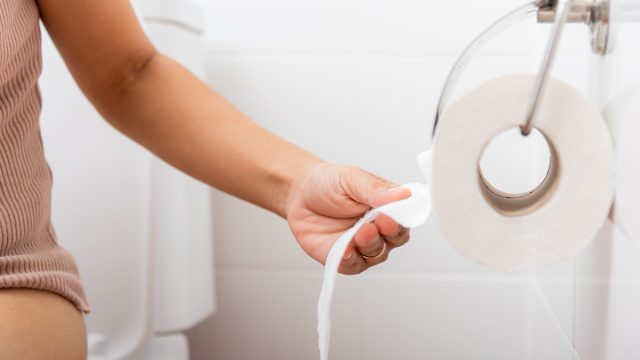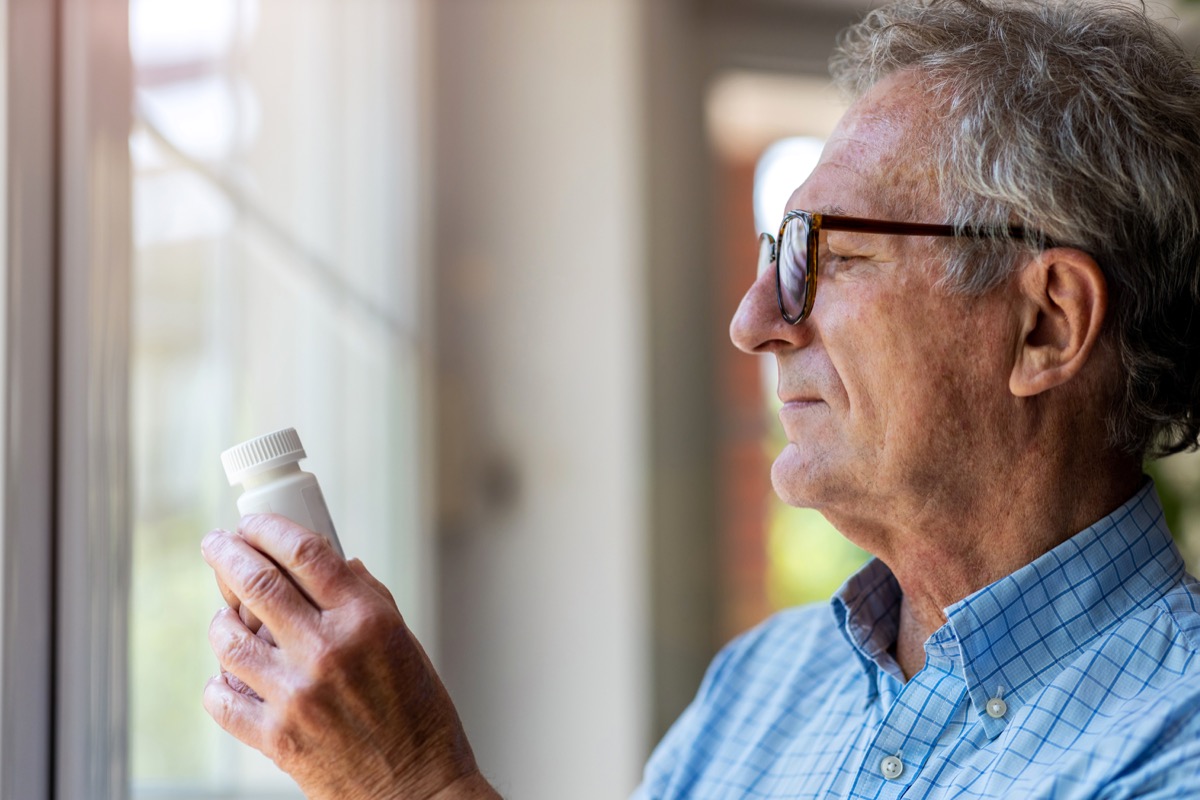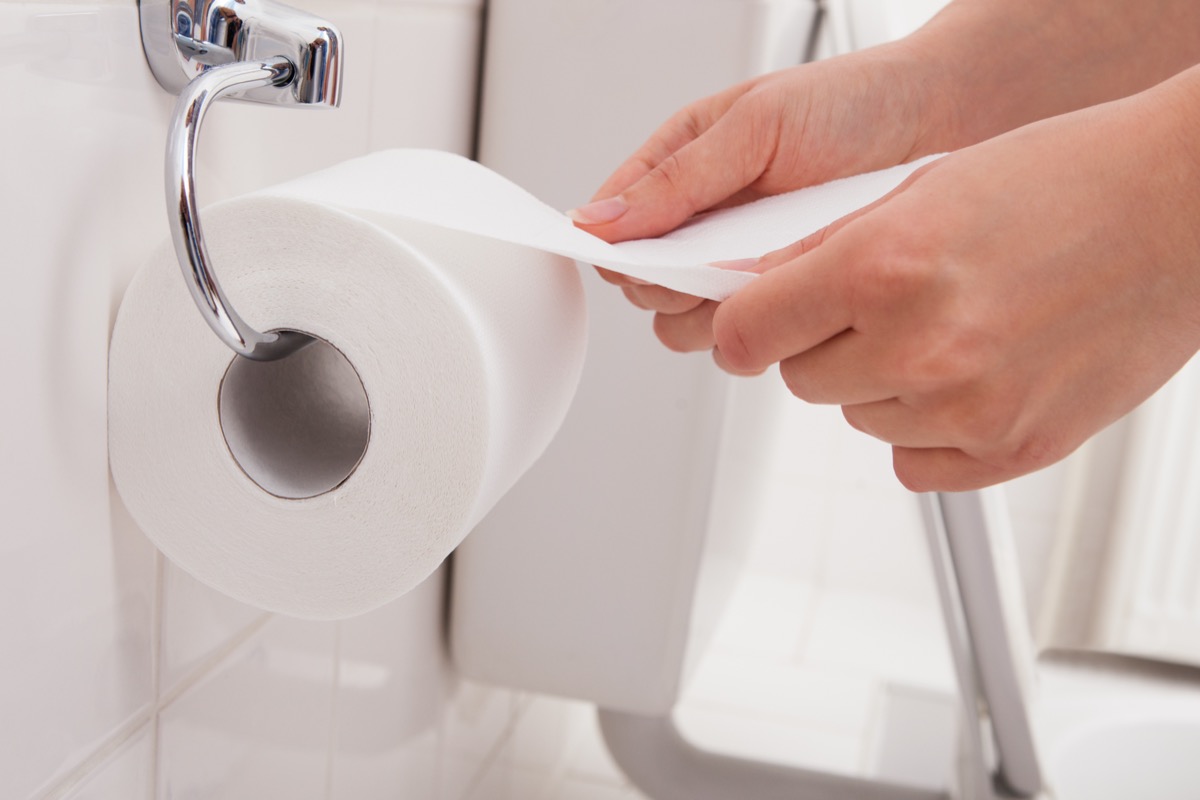7 Reasons You’re Not Going to the Bathroom Every Day, According to Doctors

If you’ve ever experienced constipation, you’re not alone: The Cleveland Clinic estimates that more than 2.5 million Americans visit their doctors about the condition each year, making it one of the most common gastrointestinal complaints in the U.S.
Though bathroom frequency can vary from person to person, constipation is characterized by infrequent bowel movements—fewer than three per week, or an average pace of every other day—and difficulty passing stools. If this sounds familiar, you might be wondering what’s causing your discomfort, and whether there’s anything you can do about it.
Read on to learn seven reasons you’re not going every day, and how to take back control of your bathroom habits.
READ THIS NEXT: If You Notice This in the Bathroom, Get Checked for Diabetes, Experts Say.
1
You’re not getting enough fiber.

Oftentimes, relieving constipation can be as easy as altering your diet. In particular, you may need to up your fiber intake, says Soma Mandal, MD, a board certified internist at Summit Health in Berkeley Heights, NJ. “A lack of fiber in the diet can cause constipation because fiber helps to bulk up the stools and make them easier to pass,” she tells Best Life.
That said, The U.S. Department of Agriculture’s 2020-2025 Dietary Guidelines for Americans reports that over 90 percent of women and 97 percent of men don’t get enough fiber through their diets. To increase your intake, fill your plate with high-fiber, plant-based foods such as beans and other legumes, chia seeds, berries, whole grains, broccoli, and more.
READ THIS NEXT: If This Happens to You in the Bathroom, Get Checked for Heart Failure.
2
You’re dehydrated.

Drinking lots of water is important for just about every bodily function, and digestion is no exception. Mandal says that being dehydrated is a common reason that you may notice less frequent trips to the bathroom. “Not drinking enough water can cause the stools to become dry and hard, which can lead to constipation.”
According to The U.S. National Academies of Sciences, Engineering, and Medicine (via the Mayo Clinic), most men need about 15.5 cups (3.7 liters) of fluids per day for men, while most women need about 11.5 cups (2.7 liters) of fluids per day. Though 20 percent of your liquid intake can come from food, you should aim to get the rest from drinking water and other unsweetened beverages throughout the day.
3
You need more exercise.

Getting adequate exercise is another way to keep your bathroom habits regular, Mandal points out. “People who exercise regularly generally don’t develop constipation,” explains Harvard Health Publishing, adding that the colon responds directly to activity, especially in older adults who tend to be more sedentary than younger adults.
“Good muscle tone in general is important for regular bowel movements,” their experts write. “The abdominal wall muscles and the diaphragm all play a crucial role in the process of defecation. If these muscles are weak, they’re not going to be able to do the job as well.”
4
You’re having medication side effects.

Many types of medication can cause constipation as a side effect. Mandal notes that opioids, antacids, and antidepressants are three common examples of drugs that can interfere with regular digestion.
If you take medication and notice that you’re not going to the bathroom every day, be sure to mention it to your doctor. They may be able to adjust your dosage, prescribe an alternative, or suggest other interventions which could ease your symptoms.
For more health news sent directly to your inbox, sign up for our daily newsletter.
5
You have an underlying medical condition.

If your constipation has persisted over a long period of time or if your symptoms are severe, it’s important to bring it to your doctor’s attention so they can help rule out any serious underlying causes. “Certain medical conditions such as irritable bowel syndrome (IBS), thyroid disorders, and diabetes can cause constipation,” says Mandal.
According to the Cleveland Clinic, it’s especially crucial to speak with your doctor about your constipation if you have any additional symptoms. “You should call your doctor if you have severe pain, blood in your stools, or constipation that lasts longer than three weeks,” their experts write.
6
You’re stressed out.

Stress can take a physical toll on our bodies, including on our digestive tracts. “Chronic stress can disrupt the normal functioning of the digestive system and lead to constipation,” says Mandal.
A 2014 study published in the journal Expert Review of Gastroenterology & Hepatology there are several ways that stress may have an effect on the gut: by reducing the number of healthy gut bacteria and increasing intestinal permeability. Additionally, the researchers write that hormonal changes associated with stress can divert blood away from the intestines and other digestive organs, causing intestinal movement to slow down.
7
You’re ignoring your body’s signals.

If you feel the urge to go, Mandal says it’s important to listen to your body. “Ignoring the urge to have a bowel movement can cause the stool to become harder and more difficult to pass over time,” she explains. In fact, the Cleveland Clinic warns that the longer you wait to go, the more it can perpetuate the problem.
Though constipation is more common in older adults, it’s important not to resign yourself to your new bathroom habits if they’re causing you discomfort. Speak with your doctor to find out more about breaking the cycle.
- Source: https://my.clevelandclinic.org/health/diseases/4059-constipation
- Source: http://Dietary_Guidelines_for_Americans_2020-2025.pdf
- Source: https://www.mayoclinic.org/healthy-lifestyle/nutrition-and-healthy-eating/in-depth/water/art-20044256
- Source: https://www.health.harvard.edu/diseases-and-conditions/common-causes-of-constipation
- Source: https://my.clevelandclinic.org/health/diseases/4059-constipation
- Source: https://www.ncbi.nlm.nih.gov/pmc/articles/PMC4249634/